
The bulbuls are members of a family, Pycnonotidae, of medium-sized passerine songbirds, which also includes greenbuls, brownbuls, leafloves, and bristlebills. The family is distributed across most of Africa and into the Middle East, tropical Asia to Indonesia, and north as far as Japan. A few insular species occur on the tropical islands of the Indian Ocean. There are 166 species in 32 genera. While different species are found in a wide range of habitats, the African species are predominantly found in rainforest, whereas Asian bulbuls are predominantly found in more open areas.

Gekko is a genus of Southeast Asian geckos, commonly known as true geckos or calling geckos, in the family Gekkonidae. Although species such as Gekko gecko are very widespread and common, some species in the same genus have a very small range and are considered rare or endangered.

Luperosaurus is a genus of lizards, commonly known as camouflage geckos, fringed geckos, wolf geckos, and flap-legged geckos, in the family Gekkonidae. The genus is native to Southeast Asia.

Brachymeles is a genus of skinks. The majority of the species within the genus are endemic to certain island ecosystems in the Philippines. In 2018, the Zoological Society of London through its EDGE of Existence Program listed the Cebu small worm skink as the 80th most evolutionarily distinct and globally endangered reptile species in the world, making it the most endangered member of the genus Brachymeles.
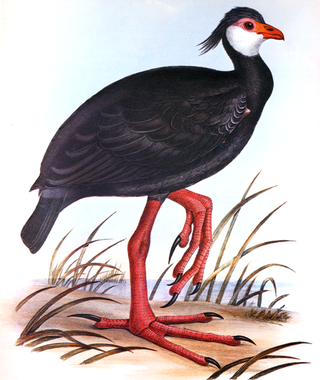
George Robert Gray was an English zoologist and author, and head of the ornithological section of the British Museum, now the Natural History Museum, in London for forty-one years. He was the younger brother of the zoologist John Edward Gray and the son of the botanist Samuel Frederick Gray.
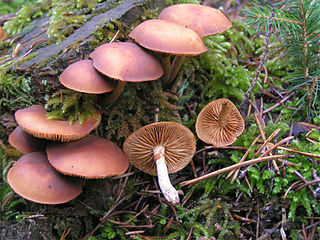
Galerina is a genus of small brown-spore saprobic fungi, with over 300 species found throughout the world from the far north to remote Macquarie Island in the Southern Ocean. The genus is most noted for some extremely poisonous species which are occasionally confused with hallucinogenic species of Psilocybe. Species are typically small and hygrophanous, with a slender and brittle stem. They are often found growing on wood, and when on the ground have a preference for mossy habitats.

Casuarina, also known as she-oak, Australian pine and native pine, is a genus of flowering plants in the family Casuarinaceae, and is native to Australia, the Indian subcontinent, Southeast Asia, islands of the western Pacific Ocean, and eastern Africa.
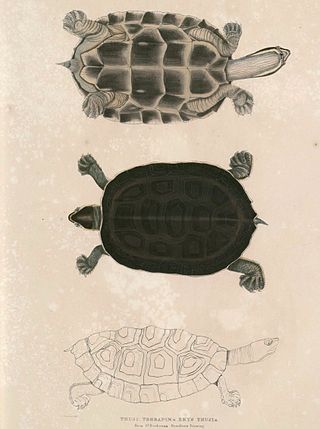
The brahminy river turtle or crowned river turtle is a species of turtle in the family Geoemydidae. The species is endemic to South Asia.

Platymantis is a genus of frogs in the family Ceratobatrachidae. They are commonly known as wrinkled ground frogs, ground frogs, and forest frogs.
The Bibundi bat is a species of vesper bat in the family Vespertilionidae. It can be found in Cameroon, Republic of the Congo, Uganda, and the Dzanga-Sangha Special Reserve.

Sacalia is a genus of turtles in the family Geoemydidae. The genus was erected by John Edward Gray in 1870. The Sacalia is native to Southereastern China, Laos, and Vietnam. It was declared an endangered turtle species by the IUCN Red List due to its illegal trade. The sacalia has a carapace of dark-brown color that permits it to camouflage to its habitat. They are believed to select the area of a river that better matches their color.
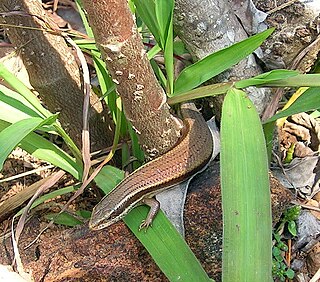
Lygosominae is the largest subfamily of skinks in the family Scincidae. The subfamily can be divided into a number of genus groups. If the rarely used taxonomic rank of infrafamily is employed, the genus groups would be designated as such, but such a move would require a formal description according to the ICZN standards.
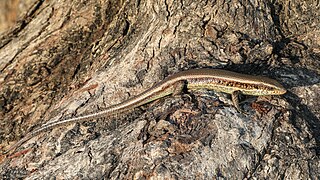
Eutropis is a genus of skinks belonging to the subfamily Mabuyinae. For long, this genus was included in the "wastebin taxon" Mabuya; it contains the Asian mabuyas. They often share their habitat with the related common skinks (Sphenomorphus), but they do not compete significantly as their ecological niches differ. This genus also contains the only member of the subfamily to occur in Australasia, the many-lined sun skink, whose wide range includes New Guinea.
Rosevear's serotine is a species of vesper bat that lives in Guinea and Liberia. It was described as a new species in 2013. It is listed as endangered by the IUCN.

Neoromicia robtertsi is a species of vesper bat found in Madagascar. It is a recently described species, as it was first described in 2012.

Insulasaurus arborens, also known as the Negros sphenomorphus, is a species of lizard of the family of Scincidae. It is endemic to the Philippines.

Sphenomorphinae is a large subfamily of skinks, lizards within the family Scincidae. The genera in this subfamily were previously found to belong to the Sphenomorphus group in the large subfamily Lygosominae.
Neoromicia grandidieri, known by the common names of Dobson's pipistrelle and yellow pipistrelle, is a species of vesper bat found in Africa. It was formerly in the genus Pipistrellus

Insulasaurus wrighti, also known commonly as Wright's sphenomorphus, is a species of skink, a lizard in the family Scincidae. The species is endemic to Palawan in the Philippines.
Insulasaurus victoria is a species of skink. It is endemic to Palawan in the Philippines. It measures about 46 mm (1.8 in) in snout–vent length.
















